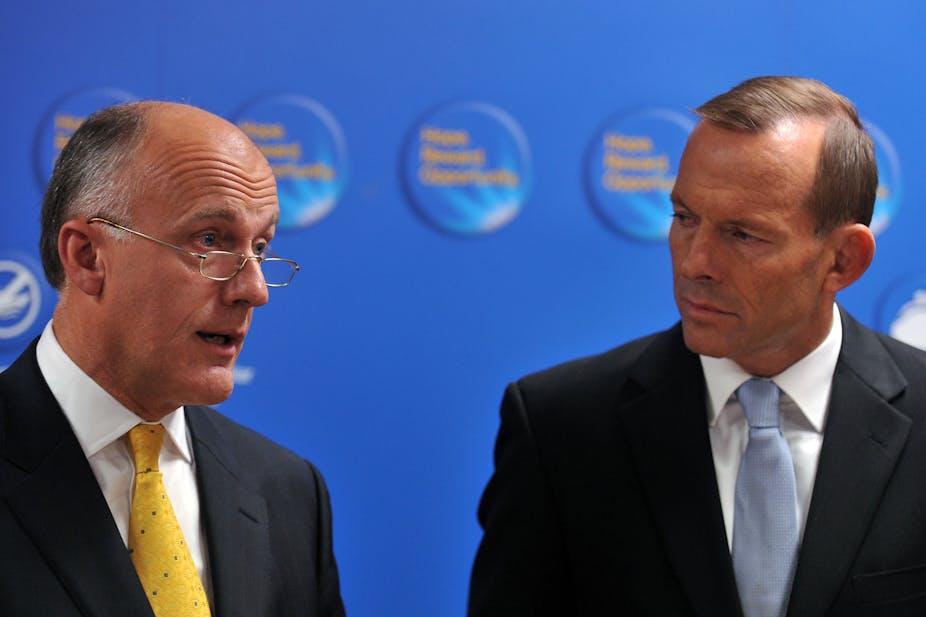To insist on his fair dinkum “sensible centre” credentials as he unveiled his workplace relations policy, Tony Abbott recounted how, when a journalist and a union member, he’d moved a strike motion after some photographers had been sacked.
More important, he recalled he’d “famously” been “one of the very few ministers around the cabinet table who had some significant reservations” about the Howard government’s WorkChoices.
It’s pretty interesting, when you think about it, that a former cabinet minister feels he has to use as a selling point the fact that he was at odds with his leader and colleagues over the signature policy of the Coalition government’s final term.
There is no evidence that Abbott, a one-time workplace relations minister, has been, is, or is set to become an industrial relations zealot. It might deeply frustrate some of his more ideological colleagues but it is unlikely to be breaking his policy heart that he can’t go further for political reasons.
In contrast, John Howard was a a true believer and his determination to indulge his passion, in the form of WorkChoices, has left Abbott with an unfortunate legacy.
Howard said before the 2007 election that if he was defeated WorkChoices would never be restored. He was right. Few policies have been such political poison.
So much so that in the last campaign Abbott promised absolutely no change on workplace relations in his first term. Now he’s produced a cautious policy for limited reforms. Anything more robust would have to wait for a second term, after a Productivity Commission review and another election.
Everyone has their dance steps in this debate. Whatever Abbott announced government and unions would see as the apparition of WorkChoices. Conjuring up the ghost, minister Bill Shorten said the opposition policy should send shivers up workers’ spines.
Business was always going to be disappointed, intoning sorrow rather than anger, while seizing on the offered scraps. (Hard-line Liberals privately are critical of business for failing to campaign harder for change.)
Like the NBN issue, IR is always going to be difficult electorally for the Coalition so the announcement has been dropped into the pre-budget week, meaning it will soon be drowned out, at least temporarily, by Tuesday’s events.
The policy is soft on workers, but would clip the wings of the unions, for whom life would anyway become much bleaker under a Coalition government. This aspect makes it less anodyne than it may appear.
It would fetter unions’ access to workplaces; limit their ability to hold projects hostage when “greenfield” deals were being negotiated, and remove the ability to restrict the use of Labor’s individual flexibility arrangements.
The Australian Building and Construction Commission would be back and there would be a tougher approach to union governance, including a Registered Organisations Commission “as a watchdog to ensure the obligations are met”.
Voters disgusted by the revelations of union corruption are likely to welcome the governance measures. Abbott is playing on high profile bad behaviour. “The only people with anything to worry about from this policy are dodgy union officials and their supporters,” he said. Business will like the checks on unions’ workplace power.
Abbott has steered right away from the formerly big debates over issues such as penalty rates and unfair dismissals. Neither area will be touched.
He pointed to the “modest” changes the government recently brought in on unfair dismissals, saying he wanted to see how these went.
The Coalition would encourage more flexible and productive working – “We support… Labor’s individual flexibility arrangements, we want them to be more effective”. But statutory individual contracts won’t be brought back (although the government and ACTU say this is what the policy does.)
Abbott is dwelling as much on what a Coalition government would not do, as on the changes it would make.
He knows his challenge is to be believed. Again, there is that albatross from the man who is usually Abbott’s hero. Howard sprung WorkChoices on the electorate after unexpectedly winning control of the Senate.
So there are plenty of pledges from Abbott. “We will keep our word. We will not deliver less than our policy and we will go no further… These are the only changes that an incoming government will make in a first term.”
Putting a sturdy fence around his policy is not just a reassurance to workers. It’s a message to business and maybe to the more gung ho of his own backbench. Don’t think that you can have a go at toughening up the policy after the election is won.
The “it doesn’t go far enough” sentiment from business organisations is no bad thing for Abbott. He knows business is fed up with the Labor so it is not going to turn anti-Coalition because he is soft on IR. And getting these criticisms reinforces the message that the policy isn’t too scary or anti-worker. Asked about the business reaction spokesman Eric Abetz shot back:“We will not be a government for sectional interests”.
Labor will push the scare campaign hard, as part of trying to fan doubts about Abbott. But this won’t be an IR election, and Labor may be fighting a “yesterday” battle. It has some echoes of 2001, when the ALP was still flogging the GST. That issue had nearly won it the 1998 election but next time round, it had lost a great deal of its bite.
WorkChoices was decisive for Labor in 2007, and the memory was still potent in 2010. In 2013 industrial relations certainly remains potentially sticky for the Coalition, but many voters probably will believe that it has learned the lesson.


